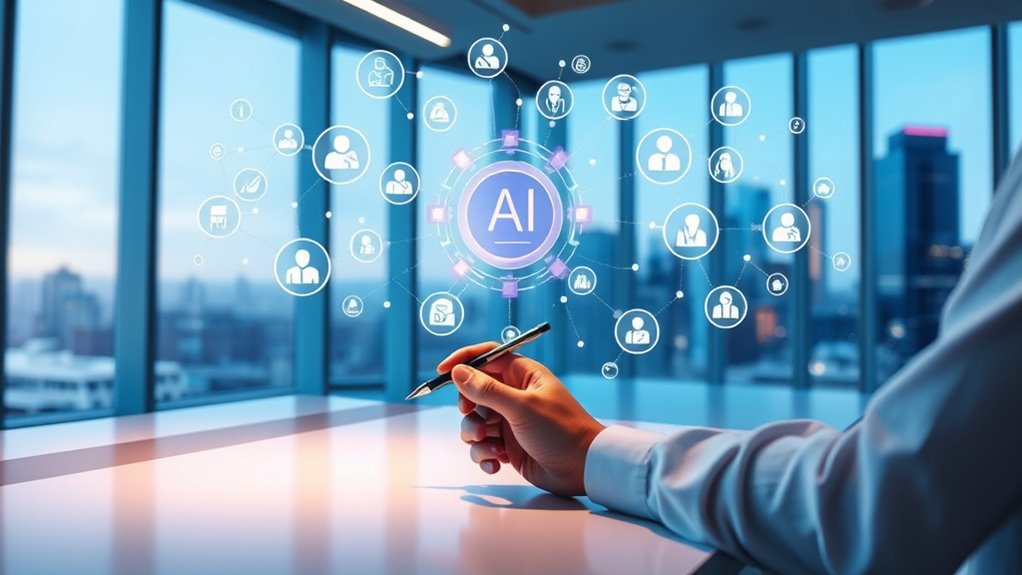Harnessing AI to craft personalized career pathways lets you identify emerging roles, upskill efficiently, and adapt to industry shifts. By understanding AI’s impact across sectors, you can target in-demand fields like AI ethics, machine learning, or virtual health. Developing soft and technical skills, obtaining relevant certifications, and staying updated with trends help you stand out. If you explore further, you’ll discover even more ways to tailor your career for future success.
Key Takeaways
- Leverage AI-driven career assessment tools to identify individual strengths, interests, and suitable emerging roles.
- Continuously upskill through targeted online courses, certifications, and industry-specific training tailored to personal goals.
- Utilize AI analytics to analyze market trends, in-demand skills, and future job opportunities for strategic planning.
- Incorporate soft skills like creativity, emotional intelligence, and adaptability alongside technical expertise for holistic career development.
- Engage in networking with industry professionals and participate in AI-focused communities to explore personalized growth pathways.
Understanding AI’s Role in Shaping Modern Careers

AI is actively transforming modern careers by creating new opportunities and reshaping existing roles. You’ll find that AI isn’t just automating tasks; it’s opening doors to entirely new job categories like AI ethics consultants, machine learning specialists, and virtual health assistants. These roles demand a blend of technical skills and soft skills such as creativity, emotional intelligence, and strategic thinking. As AI integrates into sectors like healthcare, finance, and manufacturing, you’ll need to adapt quickly to stay relevant. The shift also means traditional credentials are less critical, making upskilling and continuous learning essential. Incorporating wall organization systems can help create efficient and inspiring workspaces to support ongoing professional development. By understanding AI’s influence, you can better position yourself to leverage emerging opportunities, navigate disruptions, and future-proof your career in this rapidly evolving landscape.
Identifying Emerging Opportunities in AI-Driven Fields

As the landscape of technology rapidly evolves, recognizing emerging opportunities in AI-driven fields becomes essential for staying competitive. You should stay informed about new roles like AI ethics officers, prompt engineers, and machine learning operations specialists, which are gaining prominence. Focus on industries experiencing AI transformation, such as healthcare, finance, and cybersecurity, where innovative applications open fresh career paths. Keep an eye on market growth projections, like the AI software market reaching $134.8 billion by 2025, signaling increased demand. Networking with industry experts and participating in relevant training or certification programs can help you identify and capitalize on these opportunities. Additionally, understanding the trustworthiness and vulnerabilities of AI systems can guide you in selecting ethically sound and secure career paths. By proactively exploring these emerging fields, you position yourself at the forefront of AI-driven career development.
Developing Skills for Future-Ready Job Markets

To stay competitive in future job markets, you need to focus on developing cross-disciplinary skills that combine technical expertise with soft skills like creativity and problem-solving. Continuously updating your knowledge through learning opportunities guarantees you keep pace with rapid AI advancements. Earning relevant certifications can validate your skills and open new career pathways in emerging AI-driven fields. Understanding the Nutritional Value of Juices can also inspire innovative health-related career options.
Emphasize Cross-Disciplinary Skills
Developing cross-disciplinary skills is essential for thriving in the evolving job market driven by technological advancements. You need to blend technical expertise with soft skills like creativity, communication, and emotional intelligence. This combination helps you adapt to new roles that require human oversight of AI systems or strategic decision-making. Focus on gaining knowledge across multiple fields—such as data science, ethics, and industry-specific knowledge—to stay competitive. Employers value professionals who can navigate complex problems that span disciplines, making you more versatile. Cultivating these skills not only enhances your problem-solving ability but also prepares you for emerging roles like AI ethics officers or cross-functional strategists. Emphasizing cross-disciplinary skills gives you a significant edge as industries continue to evolve rapidly. Additionally, understanding anime culture and storytelling can foster creativity and cultural awareness that are valuable in diverse work environments.
Pursue Continuous Learning
Building on the importance of cross-disciplinary skills, staying ahead in the job market now requires a mindset of continuous learning. You need to actively seek new knowledge and adapt to rapid technological changes. This means regularly updating your skills through online courses, workshops, and industry seminars. Embrace a growth mindset that views challenges as opportunities to expand your capabilities. Focus on mastering emerging technologies, especially AI, data analysis, and cybersecurity, which are shaping future roles. Keep an eye on industry trends and seek feedback to identify areas for improvement. By prioritizing ongoing education, you’ll enhance your versatility and resilience. Additionally, understanding the significance of high refresh rates in technology can help you stay competitive in fields that rely on cutting-edge innovations. Remember, continuous learning isn’t just about acquiring skills; it’s about staying agile and prepared for the evolving demands of future-ready job markets.
Obtain Relevant Certifications
Obtaining relevant certifications has become a vital step in preparing for future-proof job markets, especially as AI continues to reshape industries. Certifications validate your skills, making you more competitive and adaptable. They demonstrate your commitment to staying current and mastering emerging technologies. Focus on areas like AI, data analysis, cybersecurity, and ethics to diversify your expertise. Here’s a quick guide:
| Certification Type | Focus Area | Benefits |
|---|---|---|
| AI & Machine Learning | AI algorithms, models | Boosts technical credibility |
| Data Analysis & Visualization | Data interpretation | Enhances decision-making skills |
| Cybersecurity | Threat detection, response | Protects digital assets |
Gaining insights into Gold IRA options can also be beneficial for diversifying your investment knowledge and securing your financial future.

As AI continues to reshape the workplace, shifting from traditional roles to AI-integrated positions requires proactive effort and adaptability. You need to recognize the evolving landscape and take deliberate steps to stay relevant. Embrace change by updating your skill set, seeking new learning opportunities, and understanding how AI tools can enhance your current role. Networking with industry peers can also help you stay informed about emerging trends. Consider how your existing strengths can complement AI technologies, positioning yourself as a valuable asset. Staying flexible and open to new responsibilities will facilitate your transition. Developing a foundational understanding of AI concepts and tools can significantly improve your ability to adapt, and cultivating soft skills like creativity and critical thinking will further support your career growth. Build a network of AI-savvy professionals, seek mentorship from industry pioneers, and regularly update your career strategy to reflect technological shifts.
Leveraging Certifications and Continuous Learning for Growth

Certifications can give you a competitive edge as you navigate AI-driven changes in your career. Embracing lifelong learning keeps your skills fresh and relevant, especially as industry trends evolve rapidly. Staying updated with the latest developments guarantees you’re prepared for new opportunities and challenges ahead.
Importance of Certification Programs
Pursuing certification programs is a strategic move to stay competitive in an evolving job market driven by AI. Certifications validate your skills and demonstrate your commitment to continuous growth. They can open doors to new opportunities, especially as traditional credentials lose prominence in AI-related roles. By earning relevant certifications, you position yourself as a credible expert and adapt quickly to industry changes. Additionally, certifications help you:
- Differentiate yourself in a crowded job market
- Gain specialized knowledge in emerging AI technologies
- Increase earning potential and job security
- Build a professional network through industry-recognized credentials
- Stay updated with the latest tools and best practices
- Understanding the importance of ethical hacking can further enhance your cybersecurity expertise and resilience.
Investing in certifications is a proactive step toward future-proofing your career and embracing ongoing learning in a rapidly shifting landscape.
Embracing Lifelong Learning Strategies
In today’s rapidly changing job landscape, embracing lifelong learning is essential to stay competitive and relevant. You should actively seek out certifications in emerging technologies, like AI or data analytics, to boost your skillset. Continuous learning helps you adapt to new tools and industry shifts, ensuring you remain valuable in your role. Focus on blending technical skills with soft skills such as creativity, emotional intelligence, and problem-solving. Regularly update your knowledge through online courses, webinars, or industry conferences. Staying curious and committed to growth not only enhances your expertise but also positions you for new opportunities. Additionally, understanding cryptocurrency trends can provide valuable insights into emerging sectors and digital innovation, further enriching your skillset. Remember, employers value individuals who prioritize learning, making it a crucial part of your career development strategy.
Staying Updated With Trends
To stay competitive in today’s fast-evolving job market, actively leveraging certifications and continuous learning is essential. Staying updated with trends allows you to adapt, stay relevant, and seize emerging opportunities. Certifications in AI, data analysis, cybersecurity, and related fields demonstrate your commitment and technical competence. Engaging in ongoing education helps you acquire new skills and keep pace with industry shifts. Additionally, you should:
- Regularly follow industry blogs, journals, and thought leaders
- Attend webinars, workshops, and conferences
- Participate in online courses and certification programs
- Network with professionals to exchange insights
- Stay informed about emerging tools and best practices
- Understanding the psychological aspects of dreaming can also enhance your ability to interpret subconscious insights, which may inform your personal and professional growth.
Embracing Soft Skills to Complement Technical Expertise

As AI transforms the workplace, it’s essential to recognize that technical skills alone won’t guarantee success. Your ability to communicate effectively, collaborate, and demonstrate emotional intelligence is just as crucial. Soft skills help you build relationships, navigate change, and solve complex problems that AI can’t easily replicate. For example, creativity and critical thinking enable you to develop innovative solutions, while empathy enhances teamwork and customer interactions. Developing these skills makes you more adaptable and resilient in a rapidly evolving job market. Employers increasingly value professionals who blend technical expertise with strong soft skills, creating more well-rounded, impactful team members. Investing in your communication, leadership, and emotional intelligence skills will position you for growth and leadership in an AI-driven world.
Strategies for Supporting Different Generations in AI Adoption

Supporting different generations in AI adoption requires tailored strategies that recognize their unique experiences and perspectives. To effectively bridge gaps, focus on personalized training, mentorship, and communication approaches. Engage Millennials by highlighting AI’s role in career growth and leadership opportunities. For Gen Z, emphasize hands-on learning and digital tools to enhance engagement. Address generational challenges with targeted support, such as flexible learning options for older workers and clear pathways for younger employees. Consider these strategies:
- Customizing training programs based on experience levels
- Promoting cross-generational mentorship and knowledge sharing
- Using accessible language to demystify AI concepts
- Offering flexible upskilling options for diverse schedules
- Encouraging collaborative projects that leverage varied perspectives
Implementing these tactics guarantees inclusive AI adoption, fostering a collaborative and adaptable workforce across generations.
Building Resilience and Adaptability in an Evolving Workforce

In an ever-changing job landscape shaped by AI advancements, building resilience and adaptability is essential for staying competitive. You need to embrace continuous learning, staying updated on emerging technologies and industry shifts. Cultivate a growth mindset to view change as an opportunity rather than a threat, which helps you adapt quickly. Develop soft skills like problem-solving, emotional intelligence, and creativity, as these remain indispensable alongside technical expertise. Flexibility in your career approach allows you to pivot when necessary, exploring new roles or industries. Building resilience also means managing stress effectively and maintaining a positive outlook amid uncertainty. By proactively strengthening these qualities, you’ll better navigate AI-driven disruptions and position yourself for ongoing success in an evolving workforce.
Frequently Asked Questions
How Can Individuals Identify Which AI Skills Suit Their Career Goals?
You can identify which AI skills suit your career goals by evaluating your current role and future aspirations. Explore emerging AI roles relevant to your industry, like data analysis or AI ethics. Invest in upskilling through online courses, certifications, and hands-on projects. Stay updated on AI trends, and network with professionals in AI fields. This proactive approach helps you develop targeted skills aligned with your career path.
What Are Practical Steps for Transitioning to an Ai-Related Role?
You can shift to an AI-related role by starting with online courses or certifications to build foundational skills. Don’t worry if you lack a technical background; many roles value soft skills like problem-solving and adaptability. Network with AI professionals, attend industry events, and seek mentorship. Stay curious, be persistent, and continuously update your skills—these steps will help you adapt and thrive in the evolving AI job market.
How Does AI Impact Job Security Across Different Industries?
AI impacts job security differently across industries. In some sectors, like healthcare and tech, it creates new roles and opportunities, boosting security if you upskill. However, in manufacturing and administration, AI automation risks displacement, making jobs less secure. You need to stay adaptable, develop both technical and soft skills, and embrace lifelong learning to protect your career as AI continues to evolve and reshape the job landscape.
Which AI Certifications Are Most Recognized by Employers?
Think of AI certifications as your keys to uncover future opportunities. The most recognized by employers include certifications in AI and machine learning from Google, Microsoft, and IBM, along with specialized credentials like AWS Certified Machine Learning Specialty and Certified Ethical Emerging Technologist. These badges show your commitment and skill, acting as a lighthouse guiding employers straight to your door in the vast sea of tech talent.
How Can Organizations Support Employees Adapting to AI Integration?
You can support employees adapting to AI integration by providing ongoing training and upskilling opportunities, encouraging a growth mindset. Offer accessible resources, mentorship programs, and certifications in emerging AI technologies. Foster a culture of collaboration where employees feel comfortable experimenting with new tools. Recognize and reward adaptability, and guarantee clear communication about AI’s role in their work. This approach helps build confidence and resilience in steering AI-driven workplace changes.
Conclusion
As you explore AI’s evolving landscape, remember that each step offers a gentle nudge toward new horizons. Embrace the quiet opportunities for growth, develop a resilient mindset, and stay curious. By nurturing your skills and adapting gracefully, you’ll find yourself seamlessly weaving into the future of work. Trust that with patience and openness, you’ll discover pathways that not only elevate your career but also enrich your journey of lifelong learning.









